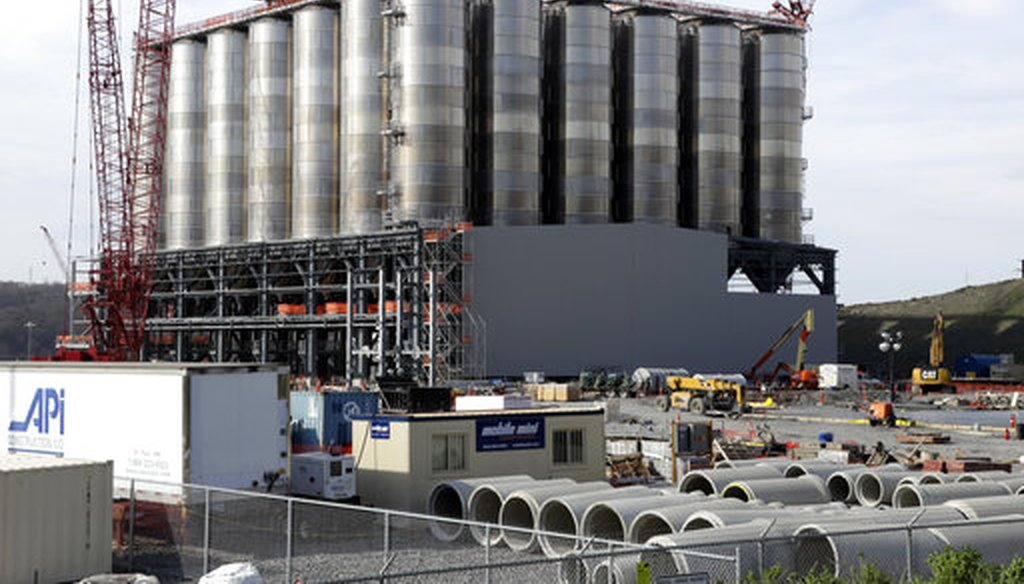

Our only agenda is to publish the truth so you can be an informed participant in democracy.
We need your help.


This petrochemical plant on the Ohio River in Monaca, Pa., is being built by the Royal Dutch Shell Co. (AP)
Three U.S. House members from West Virginia have proposed creating an Appalachian Storage Hub to store and transport large amounts of natural gas liquids in the region.
One of those House members is West Virginia Republican David McKinley. In a news release announcing House Resolution 4433 -- the Appalachian Regional Energy Hub Initiative -- McKinley said he backs the effort and cited Hurricane Harvey, the 2017 storm that shocked coastal Texas and Louisiana, as evidence that a more reliable storage system is needed.
"Developing such a ‘Hub’ in Appalachia would bring significant investment and jobs to the region," McKinley said in his op-ed for the Fairmont News.
In his news release, McKinley wrote that the danger for the nation is that today, "about 95% of America’s production of ethylene is produced on the Gulf Coast in Texas and Louisiana — a region exposed to major storms like Hurricane Harvey."
Is he right about that percentage? We took a closer look.
First, let’s explain what ethylene is.
Ethylene is commonly used to produce polyethylene, which is one of the most commonly produced plastics in the world. Food packaging and containers, bottles, and housewares are among the products manufactured from polyethylene.
McKinley’s District of Columbia office pointed us to a report to Congress by the U.S. Energy Department released in November 2018.
The report includes a line that says that "ethylene production capacity is highly concentrated in the United States Gulf Coast; over 95% of U.S. ethylene production capacity is located in either Texas or Louisiana."
The figure below illustrates the total capacity in million metric tons that each region produces, the majority of which comes from Texas and Lousiania.
Documented Ethylene Production Capacity in the U.S. (Source: Ethane Storage and Distribution hub in the United States)
After Hurricane Harvey hit the U.S. in Texas and Louisiana, 60% of the production capacity in America went offline, causing problems for industry, at least in the short term.
It’s worth noting that these numbers can be expected to shift once a major "ethane cracker" plant in Monaca, Pa., comes online in another year or two.
Crackers are facilities that break down ethane into multiple byproducts, including ethylene. The Shell Chemicals facility in Monaca is expected to produce 1.6 million metric tons per year of ethylene.
The Energy Department report cites two additional ethylene facilities in the Appalachian region that are on the drawing board, though they are slated to come online after the Monaca plant. They are in Washington Bottom, W.Va., and Shadyside, Ohio.
McKinley said, "About 95% of America’s production of ethylene is produced on the Gulf Coast in Texas and Louisiana — a region exposed to major storms like Hurricane Harvey."
The scale of operations in Appalachia are on track to grow in the coming years, but for now, McKinley is correct: Energy Department data shows that more than 95% of U.S. ethylene production capacity is located in either Texas or Louisiana.
We rate his statement True.
David McKinley, "McKinley, Miller, Mooney Introduce Legislation to Promote the Creation of An Appalachian Storage Hub," Sept. 23, 2019
David McKinley, "Now is the time to build the Appalachian Storage Hub," Jan. 9, 2019
U.S. Department of Energy, "Ethane Storage and Distribution Hub in the United States," November 2018
West Virginia Executive, "Appalachian Storage Hub: Realizing Our Potential," June 2, 2016
American Chemistry Council, "The Potential Economic Benefits of an Appalachian Petrochemical Industry," May 2017
Centre for Industry Education Collaboration, Ethylene, accessed Oct. 7, 2019
Email interview with Amy Glasmeier, professor of economic geography and regional planning at the Massachusetts Institute of Technology, Oct. 10, 2019
In a world of wild talk and fake news, help us stand up for the facts.
